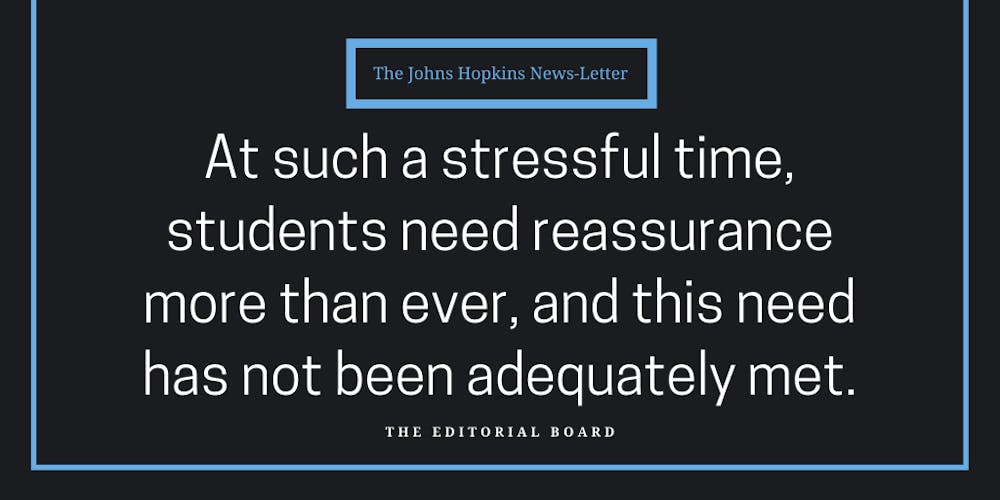Over the last few weeks, panic over the coronavirus (COVID-19) pandemic has swept the nation. Now more than ever the University needs to support students, particularly when it comes to their mental health.
Many of the University’s actions, however, have only caused students more stress. The announcement that classes were cancelled was preceded by an entire day of hearsay and confusion among the student body. When students were forced to vacate their dorms in under four days, many experienced housing instability as they scrambled to either return home, find new housing or secure an exception.
Many of those who held jobs both on and off-campus have lost their source of income, and are unsure whether they will be paid past April 12. Crucial information was and still is being imparted in a haphazard manner. Students are slowly discovering how they will collect their belongings, whether they will be paid if they work on campus and if room and board will be refunded.
Much of this uncertainty is an inevitable result of the rapid spread of the virus. As the pandemic develops, so too must the University’s plans. However, Hopkins must do more to support students’ mental health.
As of right now, students are not sufficiently informed about where they should turn for mental health resources, or whether they are any available. The most obvious resource, the Counseling Center, has not sent any updates to students. The homepage of the Counselling Center’s website features a message from March 16 that does not contain up-to-date information since classes were moved online for the rest of the semester.
Hopkins must prioritize informing students and providing access to mental health resources. 55 percent of students in a 350 student survey conducted by The News-Letter said that their mental health has been impacted by leaving campus or switching to online learning. In the same survey, over 50 percent said that they were not effectively informed about the University’s remote mental health resources. Even small gestures, such as updating the Counseling Center website or sending an email with available resources, would help alleviate some of students’ stress.
We acknowledge that these are unprecedented times. Moreover, in the past couple weeks, administrators have been quick to meet some of our demands. In response to petitions signed by thousands of students demanding alternative grading systems, Hopkins announced that all Homewood undergraduate courses would be graded Satisfactory or Unsatisfactory (S/U). The University directly cited the stress that students may face because of COVID-19 as the driving force behind this policy. Though some students did not agree with this decision, the overall response has been positive. We feel that S/U grading shows a genuine concern for health over grades, at a time when this is more important than ever.
Over the last few years, Hopkins has made an effort to take mental health concerns more seriously. Following the recommendations of the 2016 Task Force on Student Mental Health and Well-being, the University appointed Kevin Shollenberger as vice provost for student health and well-being. Student Disability Services (SDS), which is under Shollenberger’s jurisdiction, has been particularly praised for keeping in contact with students over the last few weeks. Additionally, Hopkins introduced SilverCloud, an online mental health resource, in February of this year. Both SilverCloud and the Calm app are listed as “Tools for Coping” on the Counseling Center’s homepage, showing an effort to support students virtually. The Counseling Center is also offering workshops through Zoom for the remainder of the semester, though this is not shown on the website and not all students have been made aware.
However, we are disappointed that Shollenberger and the departments he leads have not been more proactive in offering solutions and support. After making great strides toward improving mental health over the last few months, we hoped that administrators would make the effort when it most mattered. At such a stressful time, students need reassurance more than ever, and this need has not been adequately met.
While the administration’s response has been lackluster, we are proud of the work that students have done to support one another. Ever since COVID-19 began affecting daily life at Hopkins, students have come together, whether that is through online resources such as JHU Help and the Baltimore Mutual Aid Spreadsheet or students taking in underclassmen who had to leave their dorms. The response from students has been admirable. It shows that even though we may be physically separated, we can continue to help one another as a Hopkins community.
The University should be there for its students in the same way that students have been there for each other. Though the administration has made some effort to support student mental health during the COVID-19 crisis, it has not been enough. This is a difficult time for everyone, and we understand why physical safety absolutely has to take precedence, but once the new normal of remote learning began, we had hoped that the University would make more of an effort to check in on students.
As the semester continues, we hope and expect that Hopkins will listen to its students’ concerns. Hopkins is one of the most well-regarded institutions fighting COVID-19. Its students should not have to fight the administration for proper mental health resources.

















